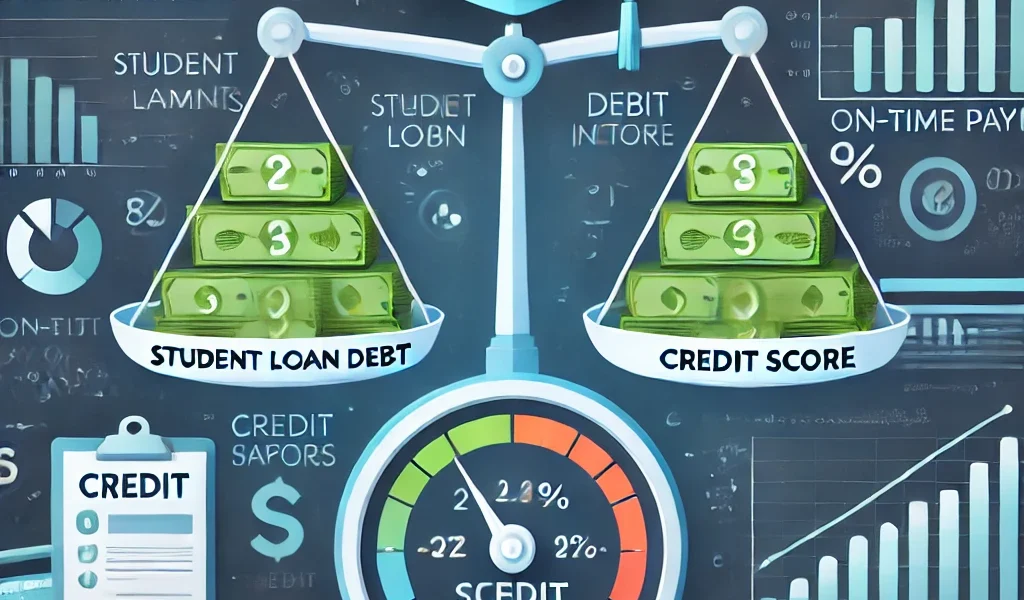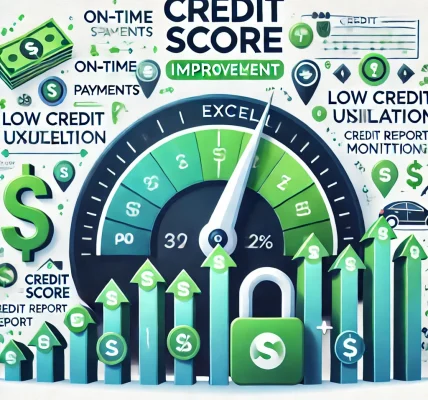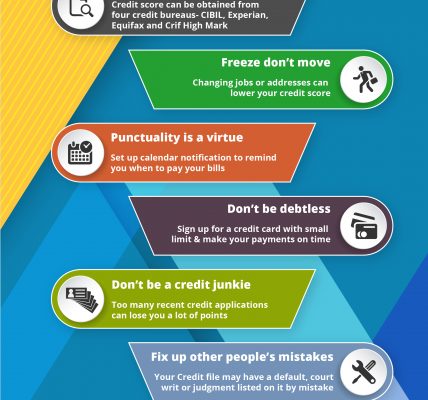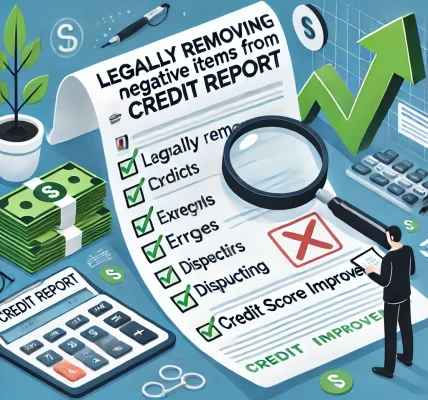Student loan debt is a reality for millions of people worldwide. Whether you’re currently in school, recently graduated, or still repaying your loans, understanding how student debt impacts your credit score and financial future is crucial. Many borrowers are unaware of how their loans influence creditworthiness, financial stability, and future opportunities.
In this guide, we’ll break down how student loan debt affects your credit score, provide actionable tips to manage your debt, and explore its long-term financial consequences.
How Student Loans Impact Your Credit Score
1. Payment History (35%) – The Biggest Factor
Your payment history is the most significant factor in your credit score. Student loan repayments are reported to credit bureaus, meaning that making on-time payments will positively impact your score, while late or missed payments can have a negative effect.
Effects on Your Credit Score:
- On-time payments → Increase your credit score over time.
- Late payments (30+ days overdue) → Can significantly lower your score and remain on your credit report for up to seven years.
- Defaulting on your loan → Severely damages your credit and may lead to wage garnishment or legal action.
🔹 Pro Tip: Set up automatic payments or reminders to ensure you never miss a due date.
2. Credit Utilization (30%) – Not as Direct, But Still Matters
Credit utilization refers to how much of your available credit you’re using. Student loans don’t count as revolving credit (like credit cards), so they don’t directly impact your utilization ratio. However, high loan balances can still affect your debt-to-income ratio (DTI), which lenders consider when you apply for new credit.
Effects on Your Credit Score:
- High student loan balances alone do not harm your score, but they may affect your ability to get approved for mortgages, car loans, or credit cards.
- If you max out credit cards while repaying loans, your score can decrease due to high utilization.
🔹 Pro Tip: Keep your credit card balances low to improve your overall creditworthiness.
3. Length of Credit History (15%) – Older is Better
The length of your credit history is an essential factor in your credit score. Since student loans often have long repayment terms (10-30 years), they can help build a long and healthy credit history—if managed correctly.
Effects on Your Credit Score:
- Keeping student loans in good standing for years helps build a strong credit profile.
- Paying off a student loan early might slightly lower your score in the short term because it reduces your active credit history.
🔹 Pro Tip: If you’re considering early payoff, ensure you have other active credit accounts (such as a credit card) to maintain your credit length.
4. Credit Mix (10%) – Variety Helps
Lenders like to see a mix of different types of credit. Having a student loan adds diversity to your credit profile, which can slightly boost your score.
Effects on Your Credit Score:
- Having both installment loans (like student loans) and revolving credit (like credit cards) demonstrates responsible credit use.
- If student loans are your only credit accounts, consider opening a low-limit credit card to improve your credit mix.
🔹 Pro Tip: Use a credit card responsibly by making small purchases and paying the full balance each month.
5. New Credit Inquiries (10%) – Applying for More Debt
Each time you apply for a new loan, a hard inquiry appears on your credit report. While student loans generally don’t require frequent applications, refinancing or taking additional loans can add inquiries.
Effects on Your Credit Score:
- A single inquiry lowers your score by a few points, but multiple inquiries in a short period may be concerning.
- Federal student loans don’t require a credit check, but private loans do.
🔹 Pro Tip: If refinancing, shop around within a short window (e.g., 14-45 days) so multiple inquiries are counted as one.
Long-Term Financial Effects of Student Loan Debt
1. Buying a Home
Student loan debt affects your ability to qualify for a mortgage due to the debt-to-income ratio (DTI). Lenders want your total monthly debt payments (including student loans) to be below 43% of your income.
How to Improve Your Chances:
- Lower your student loan payments via income-driven repayment plans.
- Pay down other debts (like credit cards) to improve your DTI ratio.
2. Starting a Business
If you dream of starting a business, student loan debt may make it harder to secure financing. Banks and investors consider your existing debt when determining risk.
Solutions:
- Build a strong credit history to increase approval chances.
- Explore small business grants or startup funding programs.
3. Retirement Savings
Heavy student loan payments can delay retirement savings. The longer you take to pay off debt, the less money you can invest in a 401(k) or IRA.
Smart Strategies:
- Contribute at least enough to your employer’s 401(k) to get matching funds.
- Consider aggressive repayment strategies if your loans have high interest rates.
How to Manage Student Loans Effectively
1. Explore Repayment Plans
Federal student loans offer options such as:
- Income-Driven Repayment Plans (IDR): Adjust payments based on income.
- Public Service Loan Forgiveness (PSLF): Forgives remaining balance after 120 qualifying payments.
2. Consider Refinancing (But Be Careful!)
Refinancing student loans can lower your interest rate, but it’s not for everyone.
- Best if you have good credit and stable income.
- Avoid refinancing federal loans unless you’re sure you won’t need loan forgiveness or income-based repayment.
3. Make Extra Payments When Possible
Even small extra payments toward principal can reduce interest costs and shorten repayment time.
🔹 Pro Tip: Use windfalls (tax refunds, bonuses) to make lump sum payments.
Final Thoughts
Student loan debt has a major impact on your credit score and financial future. However, with careful management, you can maintain a strong credit profile while repaying your loans.
Key Takeaways:
✅ Pay on time to maintain a strong credit score. ✅ Keep credit card balances low to avoid high DTI. ✅ Use credit mix wisely to demonstrate responsible credit use. ✅ Explore repayment options to make debt more manageable. ✅ Plan ahead for major financial milestones like homeownership and retirement.




